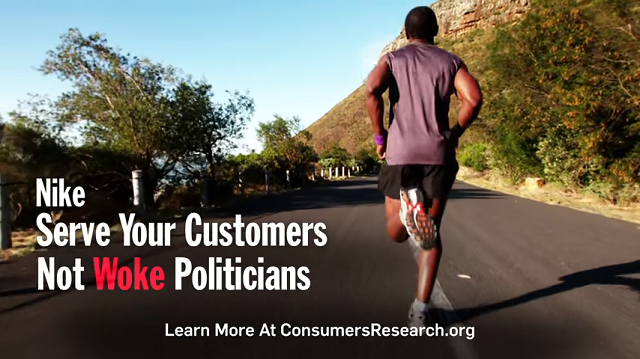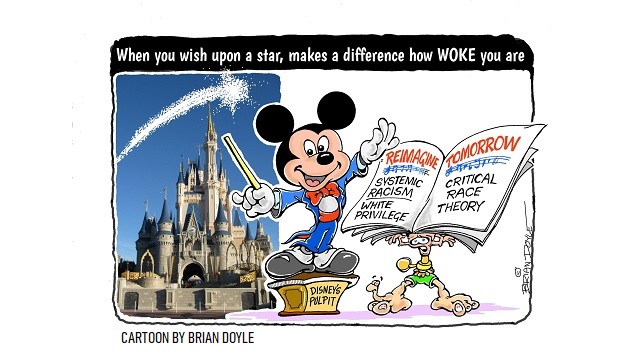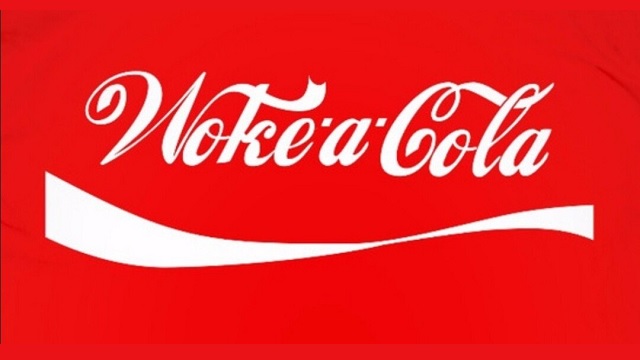Say Hello To The Newest Enemy Of Woke, Inc. [Videos]

Today, major corporations scramble over each other to sell us their woke credentials, in an apparent fading interest in the products they were originally known for. Now, it seems, these companies are more eager to advertise their opinions on voter laws, pronouns, green new deals and whatever else woke activists decide matters most this month.
Working class people aren’t buying it. Increasing numbers of employees view the whole circus with disdain. Consumers are voting with their feet. And now there’s a new enemy of Woke, Inc.
Meet Consumers’ Research, a conservative consumer group that has invested over a million US dollars to tell American Airlines, Coca-Cola and Nike to forget wokeness and start paying attention to their customers again.
In three 30-second ads released by the non-profit this week, the companies’ hypocrisy is made public and their CEOs are called out by name.
“American [Airlines] requires passengers to show ID to fly, but attacks Texas’s popular voter ID law… Doug Parker, American Airlines: serve your customers, not woke politicians,” the first ad protests. The ad also complains of “shrinking legroom during Covid” even as the company received billions in taxpayer bailouts and its CEO received a $10 million salary.
Addressing Coca-Cola, a second ad warns against products that are “poisoning America’s youth and worsening the obesity epidemic” from a company that “benefitted from forced labour in China” while “funding phoney science to minimise the harms” of their beverages.
Nike receives the harshest scrutiny from the campaign. “Nike is constantly political,” the ad asserts. “Why?”:
Cover.
Congressional reports suspect that Nike used forced labour in China. Religious minorities were ripped from their families, sterilised, sold to factories. Nike made shoes in those same areas. Congress tried to ban Nike’s labour practices. Nike fought back with highly-paid lobbyists.
The video ads will be shown on cable TV channels and websites across the US. They will also target local markets where each company is headquartered. “We are giving consumers a voice,” Will Hild, executive director of Consumers’ Research, said in a statement. “These companies should be putting their energy and focus on serving their customers, not woke politicians.”
In a press release, Consumers’ Research promised that these three ads are only part of “the first phase of an ongoing campaign exposing companies that have increasingly put politics ahead of their customers.”
This is a welcome move.
It is time for Woke, Inc. to wake up to the interests of everyday people. As I’ve previously warned, what has arisen in recent years is essentially an ecosphere of Communist dictatorships within capitalist empires. Consumers are subjected to the noise constantly, but those most hurt are workers who suffer under “authoritarian governance in [their] work and off-hours lives,” according to political philosopher Elizabeth Anderson.
Left unchecked, what we see to be moving towards is parallel marketplaces — as conservatives, libertarians and the working class boycott woke businesses and patronise companies that remain above the political fray. And this won’t stop at consumer goods: we are already seeing the media and entertainment sectors divide over politics.
In this environment, it is all too common to read corporate statements that begin with, “As a company, we believe…” But since when do companies believe anything? They make products and deliver services.
And if they forget why they exist, the market will eventually remind them, for better or worse.
COLUMN BY
Kurt Mahlburg
Kurt Mahlburg is a writer and author, and an emerging Australian voice on culture and the Christian faith. He has a passion for both the philosophical and the personal, drawing on his background as a graduate… More by Kurt Mahlburg.
RELATED TWEET:
Has the conservative pushback against 'woke' corporations begun? https://t.co/VlT7z8v2lm pic.twitter.com/I2tRGxqZPB
— Newsmax (@newsmax) May 21, 2021
RELATED ARTICLE: Rock Icon Van Morrison Bucks Woke Establishment, Left Goes Nuts
EDITORS NOTE: This MercatorNet column is republished with permission. ©All rights reserved.




